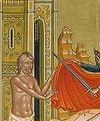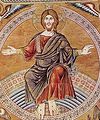

| Previous day | Next day |
| Old Style
January 29
|
Sunday |
New Style
February 11
|
| Meat-fare Sunday. Tone 3. | No fast.
|
![]() Translation of the relics of Hieromartyr Ignatius the God-bearer, bishop of Antioch (107).
Translation of the relics of Hieromartyr Ignatius the God-bearer, bishop of Antioch (107).
Martyrs Romanus, James, Philotheus, Hyperechius, Abibus, Julian, and Paregorius, at Samosata (297). Hieromartyrs Silvanus, bishop of Emesa, the deacon Luke, and the reader Mocius (Mucius) (312). St. Lawrence, recluse of the Kiev Caves and bishop of Turov (1194). Sts. Gerasimus (ca. 1441-1467), Pitirim (1455) and Jonah (1470) bishops of Perm. St. Ignatius, bishop of Smolensk (1210). St. Andrew (Rublev), iconographer, of the Spaso-Andronikov Monastery (Moscow) (1430).
Martyrs Sarbelus [Thathuil] and his sister Bebaia, of Edessa (98-138) St. Barsimaeus the Confessor, bishop of Edessa (2nd c.). St. Aphrahates the Persian, hermit, of Antioch (370). St. Gildas the Wise, abbot, of Rhuys, Brittany (ca. 570). St. Severus, bishop of Bourges (591). St. Ashot Kuropalates of Tao-Klarjeti, Georgia (829). New Martyr Demetrius of Chios, at Constantinople (1802).
Thoughts for Each Day of the Year
According to the Daily Church Readings from the Word of God
By St. Theophan the Recluse

Meat-fare Sunday (35th). [I Cor. 8:8–9:2; Matt. 25:31–46]
The great judgement! The judge cometh in the clouds, surrounded by a countless multitude of bodiless heavenly powers. Trumpets sound over all the ends of the earth and raise up the dead. The risen regiments pour into the determined place, to the throne of the Judge, having already a foreboding of what verdict will sound in their ears, for everyone’s deeds will be written on the brow of their nature, and their very appearance will correspond to their deeds and morals. The division of those on His right hand and those on His left will be accomplished in and of itself.
At last all has been determined. Deep silence falls. In another instant, the decisive verdict of the Judge is heard: to some, “Come,” to the others, “depart.” “Have mercy on us, O Lord, have mercy on us! May Thy mercy, O Lord, be on us!” they shall say, but then it will already be too late to plead. We need to take the trouble now to wash away the unfavourable marks written upon our nature. Then, at the judgment, we would be ready to pour out rivers of tears in order to wash ourselves; but this would do no good. Let us weep now, if not rivers of tears, then at least streams; if not streams, then at least drops. If we cannot find even this much, then let us become contrite in heart, and confess our sins to the Lord, begging Him to forgive them, and promising not to offend Him any more through violation of His commandments. Then, let us be zealous to faithfully fulfil this promise.
Articles
 St Pitirim the Bishop of PermSaint Pitirim, Bishop of Great Perm, was chosen and consecrated to the See of Perm after the suffering and death of St Gerasimus of Perm. |
















